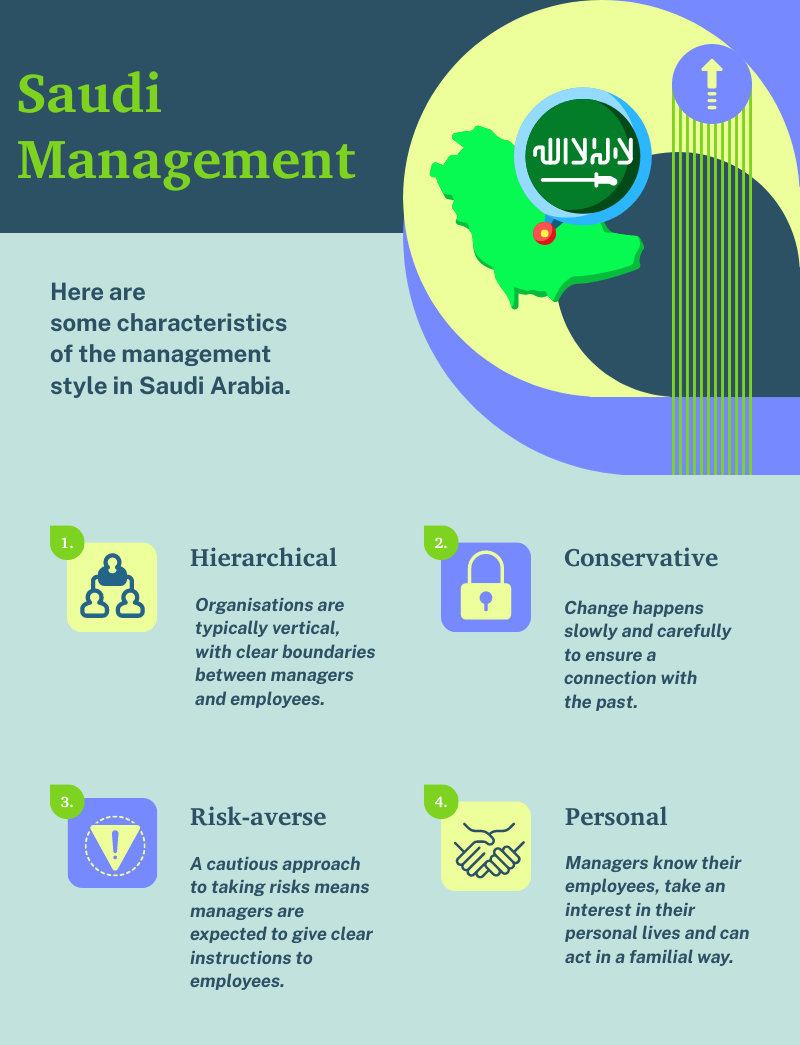
Cross Cultural Management Guide for Saudi Arabia
The guidance offered below is for managers who want to learn more about the management style and business culture of Saudi Arabia.
It provides some useful information for managers who are relocating to the country for employment as well as those who may have Saudi employees in their global or multicultural teams.
Topics covered include:
- The role of a manager
- Approach to change
- Time and priorities
- Communication style
- Negotiation style
Being a Manager in Saudi Arabia
The business culture in Saudi Arabia is, on the whole, conservative. It's important to maintain a proper degree of formality and treat everyone with respect.
Older people, for example, and those in senior positions are always deferred to and treated with the utmost respect.
- Patience is a necessary attribute.
- Things generally take longer than expected in the country. Meetings can be delayed and sometimes interrupted.
- Saudis take time to get to know people.
- In general, punctuality is expected of foreigners but not of Saudis.
- Never do anything that would make a Saudi appear less in the eyes of others, such as pointing out an error.
- Since Saudis tend to judge on appearances, you should stay in a high-standard international hotel.
- Likewise, wearing good-quality, branded clothes will impress them.
The Kingdom of Saudi Arabia is currently undergoing huge changes, politically, socially and economically. Although the culture is generally conservative, sections of it are very open to breaking rules and doing things in a different way.
The Role of a Manager in Saudi Business Culture
Managers will be more effective if they can understand how to navigate a more hierarchical approach to management.
- Employees generally do not question the decisions that have been reached by the manager.
- Managers, or those in a position to do so, will usually make decisions, with little consultation with their teams.
- Managers are expected to be both strict but at the same time caring in how they interpret and apply rules.
- Employees tend to give their managers a wider berth than they might with peers.
Approach to Change
According to academic intercultural studies, Saudi Arabia is a low-risk and low-change-tolerant culture. New projects will be carefully analyzed to assure that whatever risk they represent is thoroughly understood and addressed.
- In order for change to take hold, the idea needs to be perceived as good for the group and be accepted by the group.
- Cultural sensitivity is important with Saudi Arabia’s attitude toward risk dramatically impacted by the negative ramifications of failure on both the individual and the group.
- Remember that things take longer in the country so think 'evolution' rather than 'evolution' (although in some business sectors, they are much more adventurous with risk).

Spending time with your team outside of the office is really important, especially if you are a foreign manager in the K.S.A.
This helps build trust not only between manager and employee but between team members themselves. Try and go out with your team and enjoy yourself!
Time and Priorities
Cultural awareness is important when thinking about the approach to time, deadlines and timelines in Saudi Arabia.
- Saudis tend to prioritize people rather than plans and punctuality. Time is seen as something to be controlled, not controlled by.
- When working with people from Saudi Arabia, it’s advisable to reinforce the importance of the agreed-upon deadline.
- If you are worried about timelines, then it's a good idea to add extra touch points with your employees in order to assess progress.
Decision Making
Managers reach decisions after discussions with major stakeholders, rather than with their employees. Once a decision is reached, it is handed down to subordinates to implement.
- Decisions are not only made using statistics, logic and reason; Saudis also heavily rely on feelings and intuition.
- Try to not rush people if you are waiting on their decision - instead look for ways in which you can help them come to a decision.
Boss or Team Player?
If you are working in Saudi Arabia, it is important to remember that honour and reputation play an important role and so some cultural sensitivity will be required.
- Saudi managers do not shy away from demonstrating status and pulling rank.
- Although the management style leans towards the manager being a boss, they do also get involved with their teams when needed.
Communication and Negotiation Styles
Business is personal in Saudi culture. It will be impossible to finalize agreements without face-to-face contact.
- Decisions are made slowly. Do not try to rush the process. Most decisions require several layers of approval. It may take several visits to accomplish simple tasks.
- Saudis are tough negotiators. They believe that everything is negotiable.
- Business is hierarchical. Decisions are made by the highest-ranking person.
- Repeating your main points will be interpreted as meaning you are telling the truth.
- High-pressure tactics are counter-productive.
- Decisions are easily overturned.
- When discussing price, Saudis will often make an initial offer that is extremely low when they are buying.
- Conversely, when they are selling, their initial offer will be extremely high.
- You may need to compromise on a point if someone's honour is at stake.
- There is a tendency to avoid giving bad news and to give effusive acceptances, which may only mean "perhaps".
- Expect to be asked to make concessions. Do so with great reluctance and insist upon a similar concession from the other side.
Learn to Navigate Saudi Business Culture & Make a Great Impression
Ensure your management success by enrolling on our online Saudi Arabia training course.
Here's a video with a look inside!
The course will help you understand Saudi business culture, create trusting relationships and maximise your business performance.

 +44 0330 027 0207 or +1 (818) 532-6908
+44 0330 027 0207 or +1 (818) 532-6908

